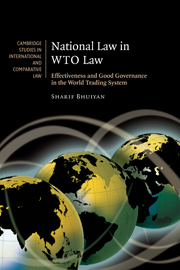Book contents
- Frontmatter
- Contents
- Acknowledgements
- List of abbreviations
- 1 Table of GATT cases
- 2 Table of WTO cases
- 3 Table of other cases
- 1 Introduction
- Part I
- 2 National law in international law
- 3 Systemic WTO obligations regarding national law
- 4 WTO dispute settlement procedures and national law
- Part II
- References
- Index
3 - Systemic WTO obligations regarding national law
Published online by Cambridge University Press: 23 February 2010
- Frontmatter
- Contents
- Acknowledgements
- List of abbreviations
- 1 Table of GATT cases
- 2 Table of WTO cases
- 3 Table of other cases
- 1 Introduction
- Part I
- 2 National law in international law
- 3 Systemic WTO obligations regarding national law
- 4 WTO dispute settlement procedures and national law
- Part II
- References
- Index
Summary
Introduction
As already noted in Chapter 1, compared to many contemporary international treaties, the WTO agreements make it much more common for international and national legal norms to have endless points of contact between them. While the reasons for this have been discussed before, it is worth emphasizing that, because the WTO treaty is a standard-setting regime (i.e. it sets out standards of treatment for goods, services and intellectual property rights and thus delineates the scope of lawful national conduct), most of the WTO obligations have implications for domestic laws of Members. While many other branches of international law are predominantly concerned with particular acts or conduct of states or non-state entities, WTO law is concerned not only with specific acts or conduct, but also – and even more – with Member countries' legislative or regulatory conduct.
For purposes of discussing the implications of WTO obligations for national laws of Members, it may be useful to distinguish between substantive obligations and systemic obligations regarding national law. Substantive obligations are those that set out the standard of treatment to be accorded by one WTO Member to the goods, services or intellectual property rights originating in another WTO Member. Systemic obligations, by contrast, are those that perform a systemic function in respect of the relationship between WTO law and national law. As explained later, from the perspective of the relation between WTO law and national law, some of the obligations in both categories can also be seen as “constitutional” in character.
- Type
- Chapter
- Information
- National Law in WTO LawEffectiveness and Good Governance in the World Trading System, pp. 43 - 85Publisher: Cambridge University PressPrint publication year: 2007



